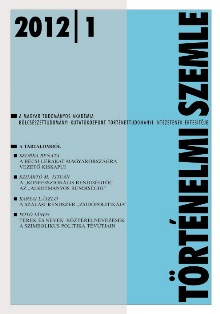Szálasi-rendszer „zsidópolitikája”
The “Jewish Policy” of the Szálasi-regime
Author(s): László KarsaiSubject(s): History
Published by: Magyar Tudományos Akadémia Bölcsészettudományi Kutatóközpont Történettudományi Intézet
Summary/Abstract: During the premiership of Döme Sztójay (March 22–August 29, 1944.), the number of Hungarian Jews deported was 437,000 and approximately 320–380,000 of them murdered, while during the Arrow Cross regime had roughly 50,000 persons deported, and approximately 30–40,000 murdered or perished. At his people’s court trial, Ferenc Szálasi was accused, among others, of wanting to destroy the remnants of the Hungarian Jewish population, and that is why he had organized the so-called “international” and the large ghettos in Budapest. In these two ghettos, in a way unparalleled in Nazi Europe, some 100,000 Jews survived the Holocaust. Today nearly everybody knows Ferenc Szálasi’s name in Hungary, but even history majors hardly know who Döme Sztójay was. In the present study we attempt to outline the history of the Jewish policy of the Szálasi regime based on new sources hardly known in the literature on the subject, including the daily minutes of the Budapest Central Jewish Council, orders of the chief police commissioner of Budapest, documents of the Arrow Cross Foreign Ministry, papers from the estate of Elek Karsai, and so on. Our aim has not been some kind of “rehabilitation” in any way of either Szálasi and/or his mass murderous regime, all we wish to demonstrate is the political and ideological reasons behind the fact that ten times fewer Jews were murdered or annihilated during the Szálasi-regime than during the Horthy–Sztójay-regime. The Jewish policy of Szálasi was more opportunistic than that of the Sztójay-government: the ghettos were established and the death marches stopped against the wishes of the Germans. In all probability Szálasi did not wish to completely dejewify Budapest during the war, because he hoped that the neutral countries would recognize his regime. He wanted his Jewish policy to show that he was a sovereign, legitimate head of state. Hungarian Jews had not only the Red Army besieging the capital to trust. At the very end of the war even SS Reichsführer Heinrich Himmler was also inclined on occasion to spare the lives of smaller or larger groups of Jews to advance the success of his attempts at separate peace. Those who had returned from the deportations did not owe their lives to Szálasi, and the prisoners of the Budapest ghettos had survived the siege because the units of the Red Army drove the Hungarian and German soldiers out of Budapest on January 18, 1945.
Journal: Történelmi Szemle
- Issue Year: 2012
- Issue No: 01
- Page Range: 103-132
- Page Count: 30
- Language: Hungarian

